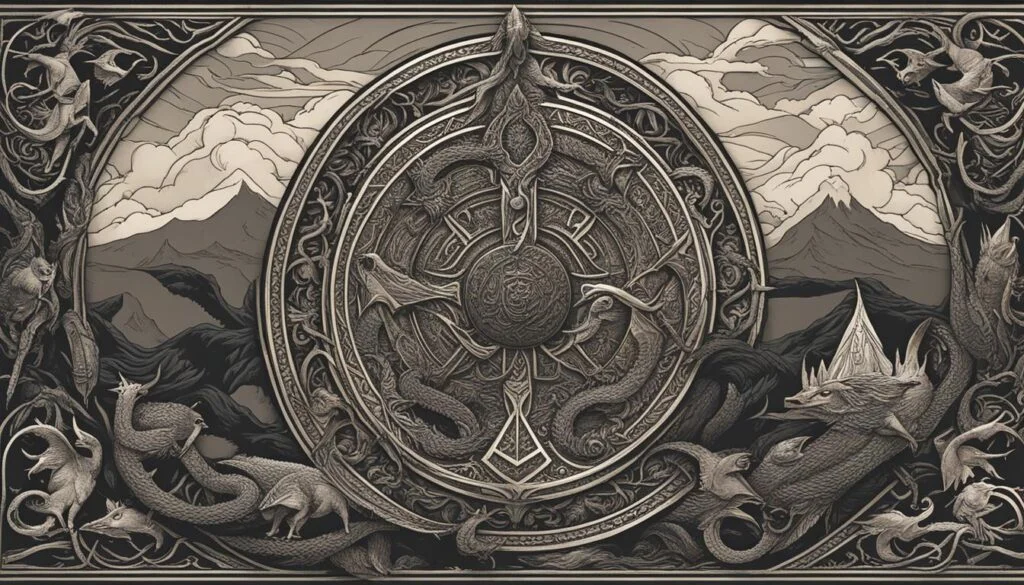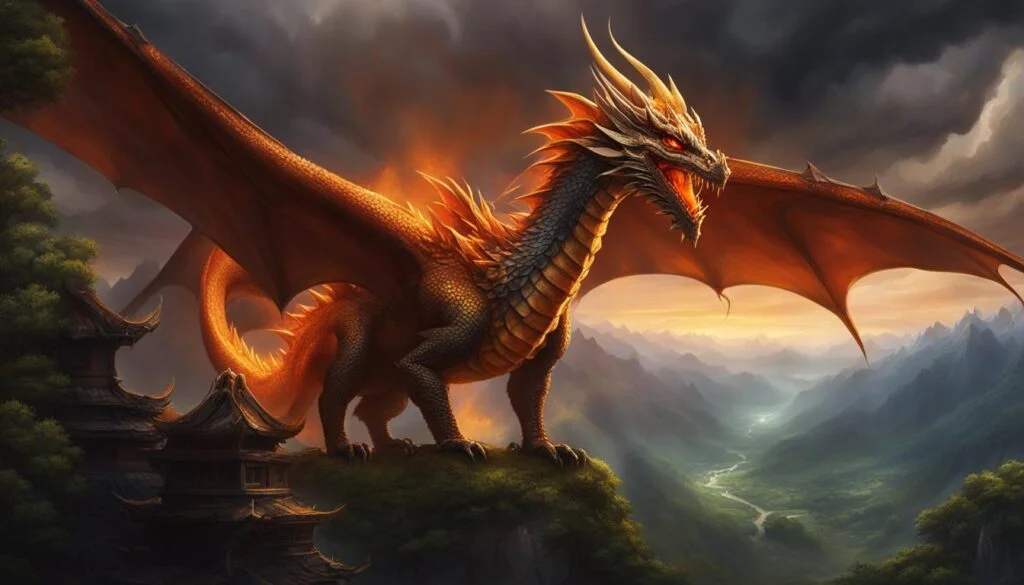Norse mythology has a fascinating history that dates back centuries. Many people wonder if it predates Christianity, as there are similarities and differences between the two belief systems. In this article, we will delve into the timeline and origins of Norse mythology, compare its gods and goddesses to those of Christianity, and explore the influence of Norse mythology on Christian traditions.
Before we dive in, let’s take a moment to appreciate the rich tapestry of Norse mythology. Filled with gods and goddesses, giants, and heroes, it offers a captivating glimpse into the ancient Norse culture and their beliefs.
Key Takeaways:
- Norse mythology has a complex timeline that predates the advent of Christianity.
- The gods and goddesses of Norse mythology have their own unique characteristics and powers.
- Norse mythology likely originated among the Germanic tribes of Scandinavia and northern Germany.
- The Viking Age played a significant role in the development and solidification of Norse mythology.
- Written records of Norse mythology started to appear in the 13th century CE.
Main Norse Mythology Gods and Goddesses
Norse mythology is a fascinating tapestry of gods and goddesses who held immense significance in the lives of the ancient Norse people. These deities were revered and worshipped, and each possessed their own unique qualities and powers.
Odin
Odin, also known as the Allfather, was the chief god of Norse mythology. As the ruler of Asgard, Odin held sway over many domains, including war, wisdom, and magic. He was often depicted as a bearded figure wearing a cloak and carrying a spear.
Thor
Thor, the god of thunder, was known for his incredible strength and his trusty weapon, the hammer Mjölnir. He was a protector of both gods and humans, and his adventures against powerful foes were legendary.
Loki
Loki, the trickster god, was a complex figure in Norse mythology. Not always aligned with the other gods, his mischievous nature often led to chaos and conflict. Despite this, Loki was also clever and played crucial roles in many mythological tales.
Freyja
Freyja, the goddess of love and beauty, was one of the most revered goddesses in Norse mythology. She was associated with fertility, war, and magic. Freyja was known for her beauty and charm, captivating both gods and mortals alike.
Freyr
Freyr, Freyja’s twin brother, was the god of fertility, prosperity, and peace. He was often depicted holding a sword and a sheaf of grain, symbolizing his roles as a warrior and a provider of abundance.
Baldr
Baldr, the god of light, was known for his beauty and kindness. He represented purity and was beloved by all. Baldr’s tragic death marked a turning point in Norse mythology
Frigg
Frigg, the queen of Asgard and the wife of Odin, was the goddess of marriage, motherhood, and household. She was a powerful figure associated with wisdom and foresight, often sought for her guidance in matters of destiny.
Tyr
Tyr, the god of war and justice, was known for his bravery and sense of duty. He sacrificed his right hand to bind the wolf Fenrir, an act that demonstrated his strong moral character and commitment to protecting the gods.
Njord
Njord, the god of the sea and wind, was associated with seafaring, fishing, and prosperity. He was also revered as a patron of commerce and wealth, providing blessings to those who sought his favor.
Heimdall
Heimdall, the guardian of Asgard, was known for his keen senses and the ability to see and hear all that transpired in the nine realms. Heimdall’s vigilance and role as the watchman of the gods made him a crucial figure in Norse mythology.
These gods and goddesses, with their diverse powers and personalities, shaped the mythological landscape of Norse culture. Their stories and legends continue to captivate and inspire us today, offering a glimpse into the rich tapestry of Norse mythology.
When Did Norse Mythology Start: The Earliest Origins

The origins of Norse mythology can be traced back to the prehistoric period. It is believed that the myths and legends of Norse mythology originated among the Germanic tribes living in Scandinavia and northern Germany. The exact date of the inception of these stories is uncertain, but they likely evolved through oral traditions and borrowed elements from neighboring cultures.
The rich tapestry of Norse mythology took shape over time, embodying the beliefs and experiences of the ancient Norse people. These captivating tales not only provided entertainment and explanations for natural phenomena but also shaped their worldview and influenced their culture.
While the precise timeline of Norse mythology remains elusive, its significance and impact are undeniable. Through the centuries, these myths have continued to fascinate and inspire people worldwide, leaving an enduring legacy in art, literature, and popular culture.
From the earliest origins of Norse mythology to the present day, the tales of gods, heroes, and giants continue to captivate and evoke a sense of wonder. The next section will delve into the main gods and goddesses of Norse mythology, highlighting their unique characteristics and contributions.
The Formation of a Distinct Norse Identity
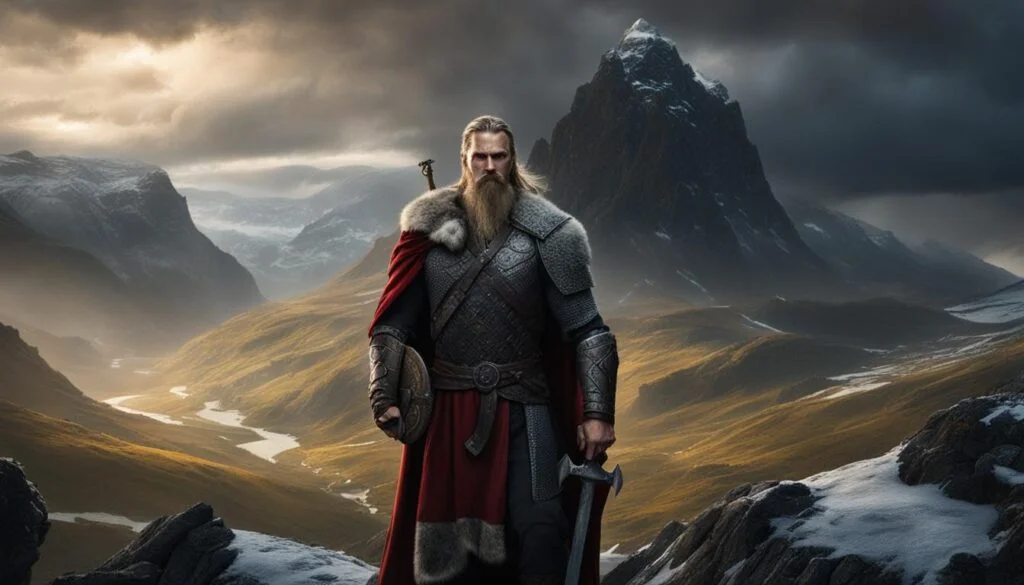
The Viking Age, spanning from the late 8th to the early 11th century, marked a significant period in Norse history. As the Vikings embarked on daring voyages and conquered new lands, they spread their mythology and beliefs, shaping their identity and culture.
During this time, Norse mythology began to take a more defined shape, solidifying into its recognizable form. Written records, such as the Prose Edda and the Poetic Edda, provided invaluable insights into the myths and their meanings. These texts served as a means of preserving and passing down the rich oral traditions of Norse mythology.
The Prose Edda, written by Icelandic scholar and historian Snorri Sturluson in the 13th century, offers a comprehensive collection of Norse mythological stories, cosmology, and poetic techniques. It provides a detailed account of the gods, heroes, and various realms that comprise Norse mythology.
The Poetic Edda, also known as the Elder Edda, is a collection of anonymous Old Norse poems from the same period. These poems provide a poetic interpretation of the Norse myths and serve as a valuable resource for understanding the religious and cultural beliefs of the ancient Norse people.
The combination of oral tradition and written records during the Viking Age laid the foundation for the formation of a distinct Norse identity, where mythology played a vital role. The myths and legends that were shared and celebrated among the Norse communities helped forge a sense of common heritage and cultural unity.
When Was Norse Mythology Created: The Written Record
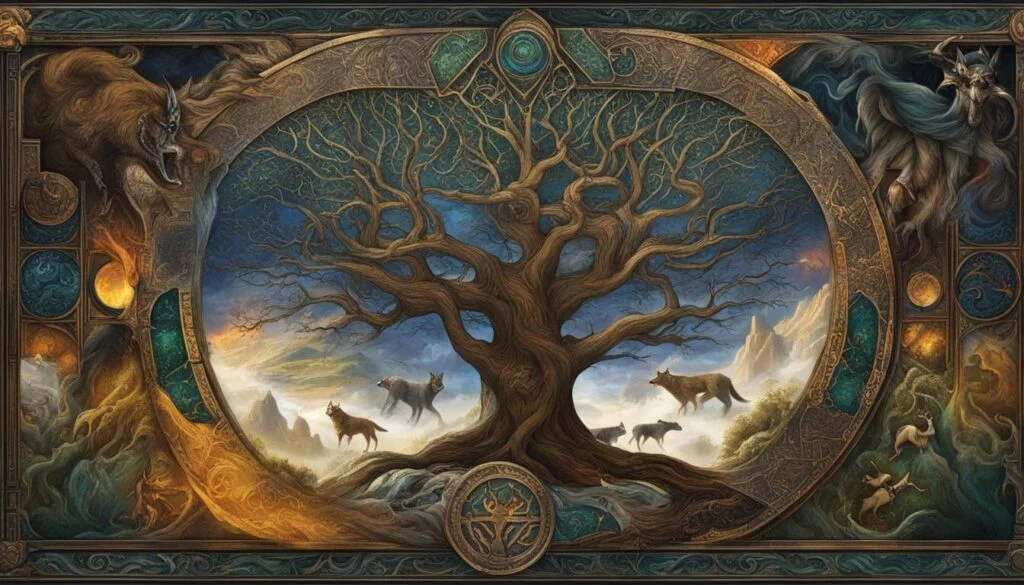
The creation of a written record of Norse mythology is a significant factor in understanding its development. The first written records of Norse mythology can be traced back to the 13th century, with works like the Prose Edda and the Poetic Edda.
These texts, written long after the myths had been passed down orally, provide valuable insights into Norse mythology. They capture the stories, beliefs, and traditions of the ancient Norse people, shedding light on their rich cultural heritage.
The Prose Edda, written by the Icelandic scholar Snorri Sturluson, is a compilation of myths, legends, and poetic traditions. It serves as a guide to the Norse pantheon, detailing the exploits of the gods, their relationships, and their roles in the cosmos.
The Poetic Edda, a collection of Old Norse poems, also contributes to our understanding of Norse mythology. These poems, often attributed to anonymous authors, offer glimpses into the lives and adventures of gods, heroes, and mythical creatures.
It’s important to note that while the written records of Norse mythology provide valuable insights, they were created centuries after the myths originated. Norse mythology existed primarily as an oral tradition, passed down through generations before being recorded in writing.
Is Norse or Greek Mythology Older?
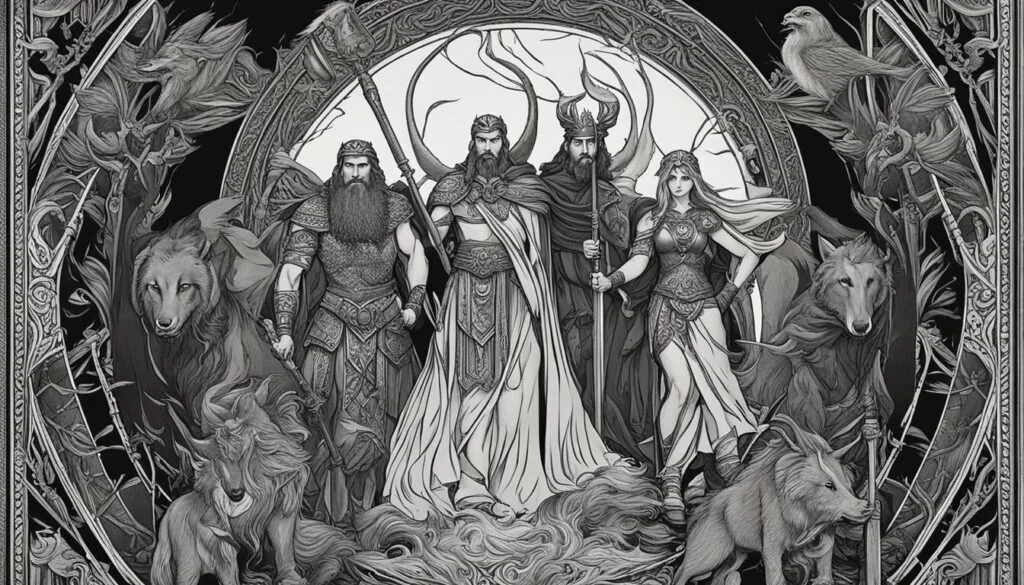
When it comes to determining the age of Norse and Greek mythology, the task becomes quite challenging. This is mainly due to the nature of oral traditions and the lack of clear dates of origin. However, based on the earliest known written records, it appears that Greek mythology predates Norse mythology.
The earliest written records of Greek myths can be traced back to the 8th century BCE. These ancient Greek stories and legends were captured in various texts and works, such as those of Homer. On the other hand, the written records of Norse mythology are relatively more recent, dating from the 13th century CE.
While Greek mythology has a longer and more established written record, it is important to note that both mythologies evolved and developed over time through the oral traditions of their respective cultures. The exact origins and the ages of these mythologies are complex and intertwined with the histories of the ancient civilizations that embraced them.
Although Greek mythology may be older in written record, both Norse and Greek mythologies carry immense cultural and historical significance. They continue to captivate us with their tales of gods, heroes, and epic adventures, offering us valuable insights into the beliefs, values, and imagination of ancient civilizations.
Now, let’s delve further into the world of mythology and explore the fascinating origins and stories of Norse and Greek mythologies.
Who is Older, Zeus, or Odin?
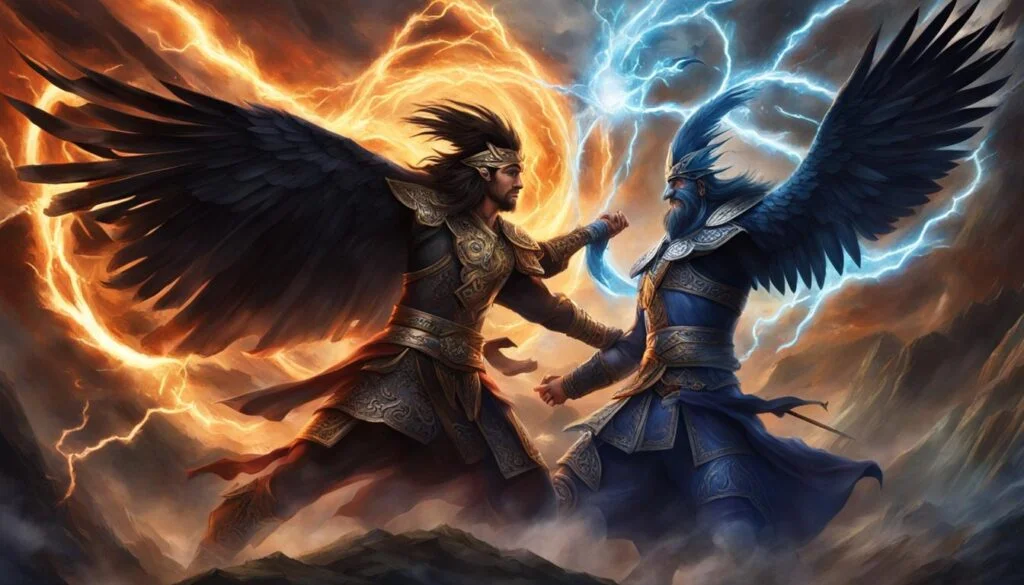
Determining whether Zeus or Odin is older is a challenging task due to overlapping timelines and the nature of oral traditions. However, based on the earliest written records, Zeus appears to be older than Odin.
The earliest written records of Zeus can be traced back to the works of Homer in the 8th century BCE, while the written records of Odin and Norse mythology are from the 13th century CE.
Zeus, the king of the Greek gods, has a long history within Greek mythology and plays a significant role in Greek culture and religion. His portrayal can be seen in various myths and epic poems, embodying different aspects of power and wisdom.
On the other hand, Odin, the chief god in Norse mythology, holds a similar position of authority among the Norse gods. He is associated with wisdom, war, poetry, and magic, and is known for his distinctive appearance, including his one eye and long white beard.
While the written records provide some insight into the age of these mythical figures, it is essential to remember that these texts were compiled long after the stories had been passed down orally. The oral tradition of storytelling in both Greek and Norse cultures dates back much further, making it difficult to pinpoint the exact ages of Zeus and Odin.
Overall, both Zeus and Odin are revered figures in their respective mythologies, representing power, wisdom, and divine authority.
How Old is Norse Mythology Compared to Christianity?
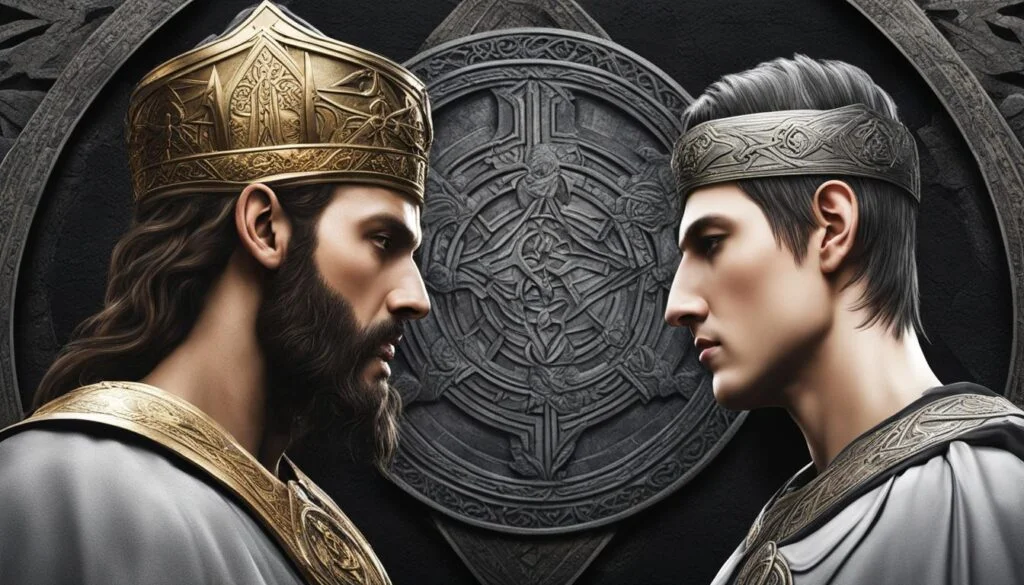
Norse mythology predates Christianity, with its origins tracing back to a prehistoric period. The written records of Norse mythology date back to the 13th century CE, while Christianity was founded in the 1st century CE. Norse mythology evolved and developed over time, while Christianity spread and became a dominant religion in the region.
The timeline of Norse mythology spans centuries, with its myths and legends passed down through oral traditions before being recorded in writing. These written records shed light on the rich and intricate tapestry of Norse mythology, providing insights into the beliefs and values of the ancient Norse people.
Christianity, on the other hand, emerged as a major religion during the 1st century CE. Founded upon the teachings of Jesus Christ, Christianity rapidly gained followers across different regions and eventually became the state religion of numerous kingdoms and empires.
Timeline Comparison: Norse Mythology and Christianity
13th century CE: Written records of Norse mythology
1st century CE: Foundation of Christianity
It is intriguing to explore the parallel developments and divergences between Norse mythology and Christianity. While Norse mythology flourished in the realms of gods, giants, and heroes, Christianity emphasized monotheism and the teachings of Jesus Christ. These contrasting belief systems reflect the unique cultural and historical contexts in which they originated.
The interaction between Norse mythology and Christianity is a topic of notable interest. As Christianity spread throughout the Norse lands, it encountered the existing Norse beliefs, leading to a fascinating blend of traditions and the reinterpretation of mythological themes and characters.
While Christianity ultimately supplanted Norse mythology as the dominant religion, Norse mythology continues to captivate and inspire people worldwide. Its enduring legacy can be seen in contemporary popular culture, literature, and various forms of media.
Overall, the age-old question of “How old is Norse mythology compared to Christianity?” highlights the cultural and historical significance of both belief systems, providing a lens through which we can better understand the intricate tapestry of human spirituality and myth.
Where Did Norse Mythology Come From?

The exact origins of Norse mythology are not well-documented due to the reliance on oral traditions and limited written records. It is believed that Norse mythology originated among the Germanic tribes of Scandinavia and northern Germany during the Bronze Age.
The stories and myths of Norse mythology were likely passed down orally from generation to generation, preserving the ancient knowledge and beliefs of the Norse people. It wasn’t until the 13th century CE that these myths were recorded in written form.
The rich tapestry of Norse mythology fascinated and influenced the culture of the ancient Norse people, shaping their worldview and understanding of the universe. Today, Norse mythology continues to captivate and inspire people around the world, showcasing the creativity and imagination of the ancient Norse civilization.
In Norse mythology, the origins of the universe are intricately woven into the stories and legends of the gods and goddesses. These ancient tales provide insights into the cosmic forces, creation myths, and the interplay between gods, giants, and humans.
Is Asatru Older Than Christianity?
Asatru, which is based on Norse mythology, has ancient roots that predate Christianity. While the modern establishment of Asatru is relatively recent, the beliefs it embraces have their origins in the ancient practices of Germanic tribes. Christianity, on the other hand, dates back approximately 2,000 years and has its roots in Judaism.
Conclusion
In conclusion, Norse mythology is a fascinating and ancient tradition that predates the rise of Christianity. While the exact origins are uncertain, Norse mythology has a deep-rooted history that evolved and influenced the culture of the Norse people. With its rich pantheon of gods and goddesses, captivating stories, and heroic tales, Norse mythology continues to captivate and inspire audiences today.
The comparison between Norse mythology and Christianity reveals stark differences in beliefs and practices. Norse mythology celebrates a pantheon of gods and goddesses with distinct characteristics, while Christianity emphasizes a monotheistic belief in one God. The timeline of Norse mythology is difficult to pinpoint, but written records from the 13th century CE provide insights into its development.
As Christianity spread and became the dominant religion in the region, Norse mythology gradually declined in prominence. However, its influence can still be seen in various aspects of modern culture. From popular books and movies to the adoption of Norse symbols and names, the legacy of Norse mythology remains deeply ingrained in our society. The ongoing interest in and fascination with Norse mythology demonstrate its enduring appeal and timeless significance.
FAQ
Did Norse mythology exist before Christianity?
Yes, Norse mythology predates Christianity.
What are the main gods and goddesses in Norse mythology?
The main deities in Norse mythology include Odin, Thor, Loki, Freyja, Freyr, Baldr, Frigg, Tyr, Njord, and Heimdall.
When did Norse mythology originate?
The exact origins of Norse mythology are uncertain, but it is believed to have emerged among the Germanic tribes living in Scandinavia and northern Germany during the prehistoric period.
How did Norse mythology develop during the Viking Age?
The Viking Age saw the spread of Norse mythology as the Vikings traveled and conquered new lands. Written records such as the Prose Edda and the Poetic Edda provided further insights into the myths and their meanings.
When was Norse mythology first recorded?
The first written records of Norse mythology can be traced back to the 13th century, with works like the Prose Edda and the Poetic Edda.
Which mythology, Norse or Greek, is older?
Based on the earliest written records, Greek mythology appears to be older than Norse mythology. The earliest written records of Greek myths date back to the 8th century BCE, while the written records of Norse mythology are from the 13th century CE.
Who is older, Zeus or Odin?
Based on the earliest written records, Zeus appears to be older than Odin. The earliest written records of Zeus come from the works of Homer in the 8th century BCE, while the written records of Odin and Norse mythology are from the 13th century CE.
How old is Norse mythology compared to Christianity?
Norse mythology predates Christianity, as its origins can be traced back to a prehistoric period, while Christianity was founded in the 1st century CE.
Where did Norse mythology come from?
Norse mythology is believed to have originated among the Germanic tribes of Scandinavia and northern Germany during the Bronze Age. The exact origins are difficult to determine due to the reliance on oral traditions.
Is Asatru older than Christianity?
Asatru, based on Norse mythology, has ancient roots that predate Christianity. However, the modern establishment of Asatru is relatively recent, while Christianity dates back approximately 2,000 years.
What can we conclude about Norse mythology and its relationship with Christianity?
Norse mythology predates Christianity and has its own rich history and cultural significance. While Christianity eventually became the dominant religion in the region, Norse mythology continues to captivate and inspire audiences today.


